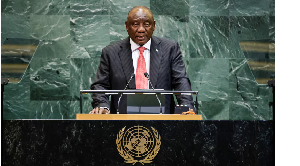Minister for Trades and Industry Alan Kyeremanten is optimistic the African Continental Free Trade Area (AfCFTA) will be a game changer for Ghana and Africa. The agreement, according to him, will go a long way to attract foreign direct investments to the country.
“I can tell you this is a very big thing. If we have not reasoned up to appreciate this, this is indeed a major development for our continent.” He said whilst addressing pressmen Wednesday.
The Africa Continental Free Trade Area (AfCFTA) is said to be the World’s largest Free Trade Area since the establishment of the Organisation of African Union (OAU). And it has been considered as the flagship programme for the Agenda 2063 of the African Union.
The Intra-African Trade when implemented, is estimated to increase at about $35 billion per annum or 52% by 2022.
At the launch of the AfCFTA operational phase in July 2019, Ghana was chosen as the host of the secretariat.
According to the Trades Minister, the secretariat will be located in Accra, is scheduled for completion by March 2020 and will have its office of residence in Ghana at the Export Trade House.
He hinted that the President, Nana Addo Dankwa Akufo-Addo has constituted an inter-Ministerial Committee that will work with the AU Commission and they comprise of some Ministries; Finance Ministry, National Security, Justice Department, Foreign Affairs Ministry, and chaired by the Trades and Industry Minister.
Mr. Kyeremanten said that the Free Trade Agreement will enhance employment opportunities for the youth in Africa.
According to him, the agreement will also address the challenge of small fragmented markets in Africa by creating a single continental market which will lead to economies of scale.
“One of the development challenges in Africa is that you have to deal with small economies with small markets… so creating a single continental market obviously benchmarks us with other major markets all over the world.”
As one of its objectives, value will be added to Africa’s abundant natural resources and industrialization will be promoted.
However, one of the frameworks for agreement states that 90% of tariff liberalization has been adopted for developing countries and least developed countries.
With trade services, it allows for Transportation, Financial Services, Tourism and Business services among others.
Business News of Wednesday, 10 July 2019
Source: www.ghanaweb.com













